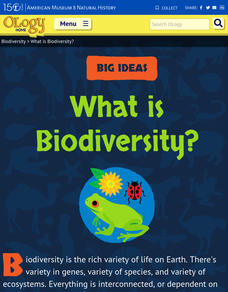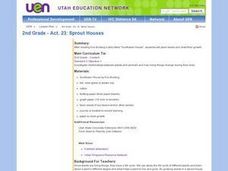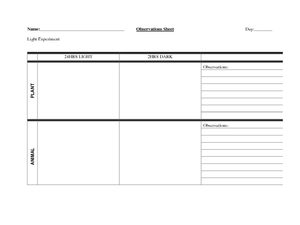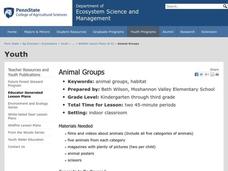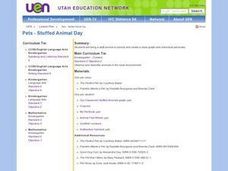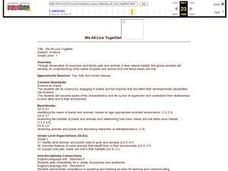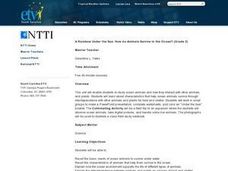ARKive
Temperate Rainforest in the Pacific Northwest
Explore the amazing temperate rainforest of the Pacific Northwest. Your class starts by investigating the animals and plants of the Northwest, specifically Washington, and then research an animal population common to the area. In small...
Alabama Learning Exchange
Good Litter, Bad Litter
Which ones can be thrown on the ground? Discover the difference between natural litter and unhealthy trash, helping scholars by using several examples. Use the information here to give them a basic background, but also encourage prior...
American Museum of Natural History
What is Biodiversity?
Not all dogs are the same just like not all finches are the same. An interactive online lesson helps individuals learn about the causes and limitations to biodiversity. The clickable sections describe the basics of the genetics of...
Curated OER
2nd Grade - Act. 23: Sprout Houses
Read the story "Sunflower House," by Eve Bunting with your 2nd graders to investigate the relationships between plants and animals. They will discover how living things change during their lives by creating their own sprout houses. In...
Perkins School for the Blind
Beanbag Toss
Why is learning how to catch and toss so important? If one has visual impairments, learning this basic skill will help him increase orientation and mobility, coordination, and cognitive development,. Mastery of this skill will also mean...
Curated OER
Organisms – Their Needs
Students compare and contrast different organisms characteristics. In this life science lesson, students design an experiment about plants and animals needs. They collect data and write their conclusion about the experiment.
Curated OER
Who Made Breakfast
Students examine animal rights by researching factory farm methods. In this animal abuse lesson, students identify how many ingredients used in their breakfast come from animals. Students research the health hazards caused to humans by...
Curated OER
Dogfighting Hurts Animals
Students discuss dogfights and relate caring for a baby to caring for their animal. In this dogfighting lesson plan, students view video about dogs forced to fight and relate to parenting skills. Students become familiar with ways to...
Curated OER
Pet Overpoulation: Fact or Fiction
Students examine the benefits of spaying and neutering animals. In this animal welfare lesson, students define the terms "spaying" and "neutering." Students listen to a lecture about the benefits of spaying and neutering and complete a...
Curated OER
Animal Groups
Students explore animal groups. In this animal science lesson, students use pictures from magazines and classify the animals into five categories. Students share why they categorized the animals the way they did.
Curated OER
Pets: Stuffed Animal Day
Students bring in their favorite stuffed animals to class, and listen to the book, The Perfect Pet. They develop graphs for their stuffed animals, and create booklets titled, My Pet Book.
Curated OER
Canine Companions
Students identify the responsibilities of being a dog owner. In this animal welfare lesson plan, students list ten important items that a dog needs to live and visit a pet store to calculate the total cost of the items. Students visit a...
Curated OER
Blubber Gloves
The ways that animals adapt to their environments is quite remarkable. In this life science lesson, fifth graders take a look at some of the ways that aquatic animals that live in Arctic or Antarctic waters survive. They perform an...
Curated OER
We All Live Together
First graders examine the lifestyle of classroom and family pets in their natural habitat. They determine the needs of plants and animals, and how those needs are met. They listen to read alouds, sing songs, and draw using computer based...
Curated OER
Prairie In A Bottle
Second graders observe images of prairie ecosystems and discuss the needs of living things. They create a prairie habitat in a closed jar to observe the water cycle and plant growth.
Curated OER
How Do Species Become Extinct?
Students examine reasons that animals become extinct. They participate in a simulation to discover that animals loss of home is the main factor that puts species near extinction in North America. Students examine over-hunting and...
Curated OER
Living On Earth
Learners discover the many different animals within various habitats and discover how each individual species interacts with its particular environment. Through charting different animals and their distinct habitat and matching animals...
Wild BC
Carbon - The Short and the Long
For this complex game about the carbon cycle, the playing field is divided into air, living, and earth zones. Children are assigned to be either plants or animals, and collect carbon tokens as they proceed from zone to zone. While the...
Curated OER
A Home for a Cricket
First graders build a habitat for crickets after studying animal survival needs. They care for and observe the crickets in the classroom habitat.
Curated OER
Marine Animals on the Move
Students work with partners to track tagged animals using real-time data from satellites. Students gather and analyze data, compile information and conclusions and then prepare a final presentation of their research.
Curated OER
Rainforest Animals
Sixth graders explore various web sites to find information about rainforest animals. They research basic concepts such as animal diet, habitat, adaptations, and endangered species, and complete assigned questions.
Curated OER
But I Need This
Third graders place everything in their desk or back pack onto their desk top. They explain why each item is needed. They receive a set of pictures and write a list of things each person or animal needs to survive. They compare people,...
Curated OER
A Rainbow Under the Sea: How do Animals Survive in the Ocean?
Second graders read books, watch videos, complete worksheets and participate in class discussions about ocean animals. They, in groups, design PowerPoint presentations on selected marine animals.
Curated OER
What's That Habitat?
Fourth graders explore the environment by researching animal characteristics. In this habitat identification lesson, 4th graders utilize paper and crayons to illustrate their own habitats or homes and discuss what it contains that is...




